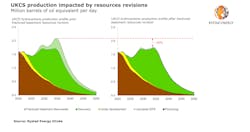UK long-term production knocked by Lancaster downgrade
Offshore staff
OSLO, Norway – Hurricane Energy’s recent downgrade of reserves at the Lancaster oilfield west of Shetland has implications for future production from the UK, according to Rystad Energy.
Since 2010, production on the UK continental shelf (UKCS) has never exceeded 2 MMboe/d. Following Hurricane’s exploration successes in previously ignored fractured basement reservoirs in the Shetlands area, there were expectations of a revival to 2.1 MMboe/d by 2035.
But analysis, based on early production from two wells, suggests Lancaster’s reservoir is more complex than previously thought, and the resultant downgrade appears to apply to other fractured basement reservoirs in the Greater Warwick Area.
According to Rystad, these basement resources had been expected to provide nearly one-fifth of future UK oil and gas output.
The consultant now predicts that the UK is heading for 1.7 MMboe/d at best in 2035 before tailing off to virtually zero by mid-century. This year the sector is set to deliver 1.59 MMboe/d.
According to Olga Savenkova, upstream analyst at Rystad: “A possible game-changer could now only be a development of technical skills for producing from fractured basement reservoirs to increase the recovery factor.”
Lancaster is on the Rona Ridge in the west of Shetland area. Since 2011, Hurricane has drilled 11 wells across its licenses in the area and reported fractured basement discoveries at Lancaster, Lincoln, Halifax, and Warwick West.
The Lancaster early production system came onstream in 2019, but production data showed reservoir pressure falling more rapidly than anticipated, hence the resource downgrade from 2.3 Bboe (reported by the company in 2017) to 0.2 Bboe.
Rystad estimates remaining 2C contingent resources at Lancaster at 58 MMbbl, down from 486 MMbbl in the 2017 Competent Persons Report.
Basement 2C resources for Lincoln are down to 45 MMbbl, and based on the Lancaster revisions, the consultant assesses resources in Halifax at 88 MMbbl.
Currently, more than 100 fields worldwide produce from basement reservoirs, but volumes produced are typically modest due to low porosity and low-permeability rock.
Typically, the rock is either unable to, or poorly suited to store hydrocarbons, although weathering and movements in the rock have formed fractures where hydrocarbons can be stored and move inside the rock.
Long-term extended well tests can shed light on the fracture network and therefore reservoir size and oil volumes. According to Rystad, a shorter-duration test can deliver information on reservoir quality and the achievable production rate but cannot determine the size of the reservoir.
10/19/2020
